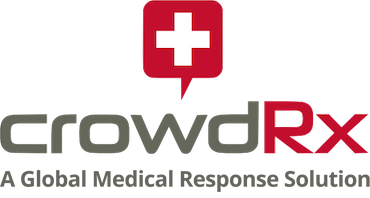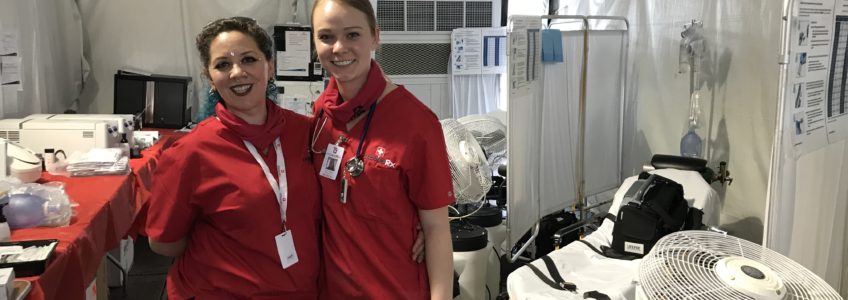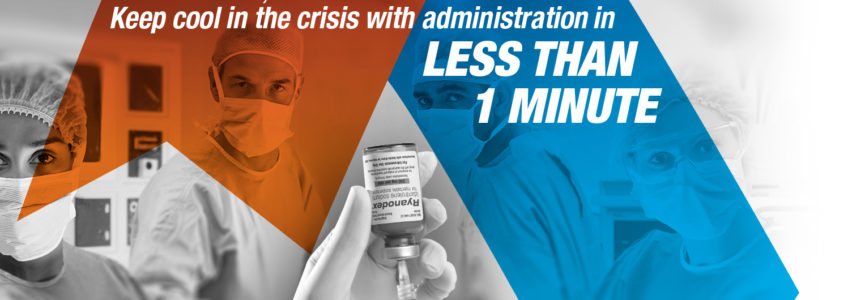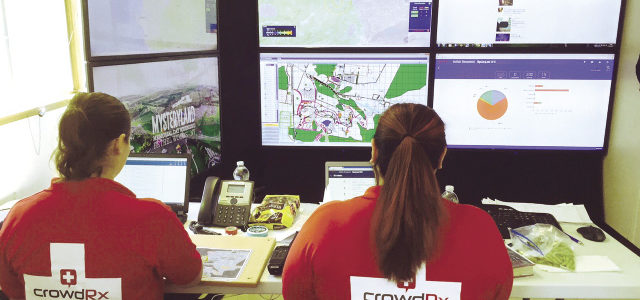Does Your Event Need a Field Hospital?
Physician-led medical services can be critical at certain types of events.
By Mitra Sorrells
The South by Southwest Music Festival kicks off March 13, while Miami Music Week gets underway March 21. Both mark the unofficial start to “festival season,” when cities around the country host huge multiday gatherings of fans spanning a variety of music genres, from electronic dance music to country and rock. These events, which often involve the dicey combination of high heat and controlled substances such as alcohol and drugs, require special attention to issues of health and safety.
The level of medical services at events can range from a first-aid center staffed by E.M.T.s to a full field hospital with doctors and advanced equipment. Experts suggest planners consider a variety of factors when determining their event’s needs, such as the proximity to a hospital, number and age of attendees, physical characteristics of the site, type of event, and typical medical issues at similar events.
“The producer has to have the philosophy of hosting a party and these are your house guests,” says Dr. Andrew Bazos, chairman of CrowdRx, a company that has provided medical services for events such as Burning Man, Electric Zoo, Mysteryland, the U.S. Open, and more. “A lot of planners may call an ambulance company, but they’re not going to think it through from a protocol playbook. Spending money on three ambulances is not always the right thing. You can get one ambulance and spend the other money on two or three higher-level providers, based on the situation.”
Bazos says a field hospital is often the best choice for events where there are high temperatures, physical activity such as dancing, and the possibility of drug use. “No matter how close the hospital is in that setting, you want to create an emergency room on site. Minutes mean life or death,” he says. A mobile hospital at an event can include a digital x-ray machine, lab equipment to do blood work on site, an ultrasound, and surgeons on call. Bazos says for large multiday events this type of setup equips staff to also treat less urgent medical needs on site rather than creating a burden for local hospitals.
He recommends planners keep detailed records of medical services provided at their events to help them determine the appropriate strategy for future events. Read more here!
Eagle Pharmaceutical Inc.’s Treatment Approved for Malignant Hyperthermia is Being Studied for Intoxication of Psychostimulant Drugs by CrowdRx, Inc.
Intoxication produced by certain illicit stimulant drugs may lead to a life-threatening condition in which the person experiences severe increase in body temperature, metabolic abnormalities, rapid heart rate, aggressiveness, delusions, convulsions, coma or even death.
Eagle Pharmaceuticals is conducting a clinical study to investigate the use of Ryanodex (dantrolene sodium) for the treatment of the acute toxicity induced by illicit psychostimulant drugs, such as MDMA (“Ecstasy”), methamphetamine or MDMC (“Molly”).
Ryanodex is currently approved for the treatment of malignant hyperthermia, a rare life-threatening condition secondary to the use of certain anesthetics and muscle relaxants. Malignant hyperthermia shares some of the same signs and symptoms observed in patients with acute intoxication by psychostimulant drugs.
These illicit psychostimulant drugs are commonly taken at large mass gathering events such as outdoor electronic music festivals.
CrowdRx, a New York based corporation, will implement Eagle’s clinical study at selected summer music festivals, to evaluate the safety and efficacy of Ryanodex for the treatment of psychostimulant drug-induced toxicity.
The current standard treatment of this serious condition is limited to cooling with ice and water and other supportive measures. Patients in the study may receive Ryanodex in addition to the standard treatment, or standard treatment only.
More details about this clinical study can be found at: https://jobs.crowdrx.org/egl-4104-c-1702/
About CrowdRx, Inc.
CrowdRx, Inc., is a New York based medical services company focused on providing health services at mass gathering events, specifically major music festivals, sporting venues, and entertainment arenas. Led by Dr. Andrew Bazos, an orthopedic surgeon specializing in sports medicine, the CrowdRx team of emergency physicians and public safety experts prescribe and deliver medical services for large gatherings nationwide. Additional information is available at jobs.crowdrx.org.
About Eagle Pharmaceutical’s Inc.
Eagle is a specialty pharmaceutical company focused on developing injectable products, primarily in the areas of critical care, orphan diseases, and oncology. Additional information about Eagle Pharmaceuticals Inc. and its products may be found at www.eagleus.com.
NFPA Festival Medicine: Life of the Party
Safe spaces, mental health services, drug checking facilities. Welcome to the brave new world of harm reduction, the latest life safety tool of the booming global festival industry.
BY JESSE ROMAN
It wasn’t always that way, according to Andrew Bazos, a surgeon who started working at large music festivals in New York City in the early 1990s. Back then, promoters were obsessed with lineups, sound production, and security—medical concerns were often an afterthought, he said. “In those days the promoter would call up a local ambulance company and arbitrarily ask amateurs to come by, find a tent near the stage, and bring whatever supplies they deemed appropriate. It didn’t go much further than that,” he said.
Bazos is now the chairman of CrowdRx, one of the industry’s largest event medical providers. Last year, CrowdRx handled medical services for dozens of eclectic events, including Burning Man, the US Open, The Gorge Amphitheatre, Madison Square Garden, and several EDM festivals including Mysteryland and Electric Zoo. Each event presents a host of unique challenges and considerations, Bazos said, and medical planning goes well beyond grabbing a roll of gauze and hitting the road. “Data now drives everything we do,” he said. “We’re using data to both predict the volume and types of incidents we’ll see so we can be prepared on the supply side. At this point we can identify what the transport rate [to the hospital] will likely be based on four or five different key data points.” Variables such as music genre, whether camping is allowed, whether alcohol will be sold, the expected number and demographics of attendees, geographic location, and proximity to hospitals can all greatly alter the supplies, equipment, and staffing required for an event, Bazos said.
Prefestival stakeholder meetings are held to review logistics and response plans, which often include tabletop exercises. Cooperation and open lines of communication are critical before and during an event, said Connor Fitzpatrick, director of operations at CrowdRx. “Nothing is done in a vacuum, and everything is interdisciplinary,” he said. “Fire, medical, security, operations—all the stakeholders have to be involved because everything affects everything else. If the promoter is charging $10 for water, for instance, that will impact medical concerns.” Click here to read more.




